
All your dinner conversation centers around the Zika virus
There’s having an interest in medical subjects and then there’s straight-up obsession. “When someone is so preoccupied about a health problem that they cannot focus on anything else, that’s a classic sign of hypochondria,” says Lauren Muhlheim, a psychologist at Eating Disorder Therapy LA. It can be hard to stop talking about an obsession once you start so instead of monopolizing every conversation with your health woes, set aside 20 minutes each day to write or talk out your worries and then no more until the next day, she advises.

You get a second opinion for your second opinion
And a fourth and a fifth… If you’re still convinced you have cancer even though multiple doctors have examined you and given you a clean bill of health, it may be a sign the problem is more mental than physical, Muhlheim says. To calm your fears, practice challenging fearful or catastrophic thoughts, she says. For instance, ask yourself, “What is the evidence that I have X? What did the doctor say? What is the most likely explanation?” And be sure to be open and honest with your doctor about everything – yes everything.

Dr. Google is your best friend
Who hasn’t found themselves falling down an Internet rabbit hole after googling “What is this rash?” But if you find yourself continuing to research a particular health problem online, night after night, you may be a hypochondriac, Muhlheim says. The cure? “Avoid googling medical symptoms online—it tends to only increase anxiety because you can find evidence for anything online,” she explains. In the meantime, try one of these natural remedies to calm anxiety.

You carry a thermometer in your purse
Constantly scanning your body for signs of illness—”Do I feel hot?” “Does my poop look too brown?” “My foot is itchy and I just ate clams!”—is a sign of hypochondria, Muhlheim says. Resist these urges to check your body, she says, as they can turn into a self-fulfilling prophecy, creating symptoms that aren’t really there. However, in rare cases anxiety could be caused by one of these medical conditions.
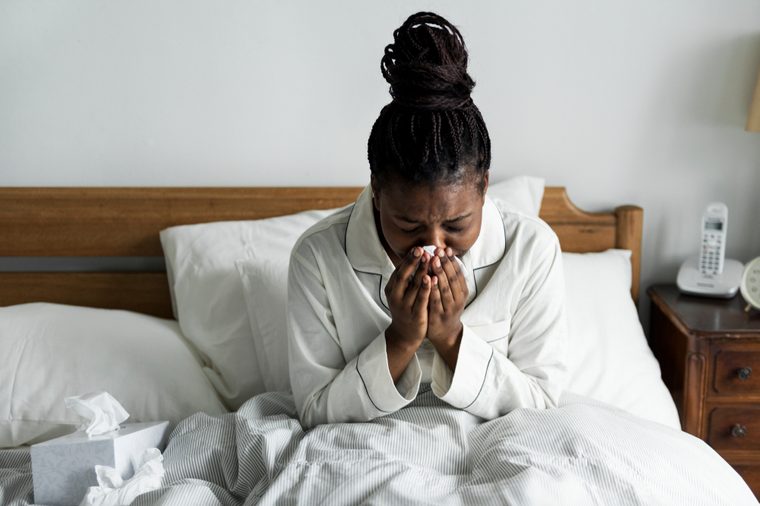
Your friend’s cold might as well be leprosy as far as you’re concerned
Do you consider all small children germ factories? Do you ditch your friend the second she sneezes? Avoiding any situation that could potentially make you sick is a red flag for hypochondria, Muhlheim says. Instead of being limited by your fears, learn calming and meditation techniques to help you manage your anxieties while you keep living your life, she says.
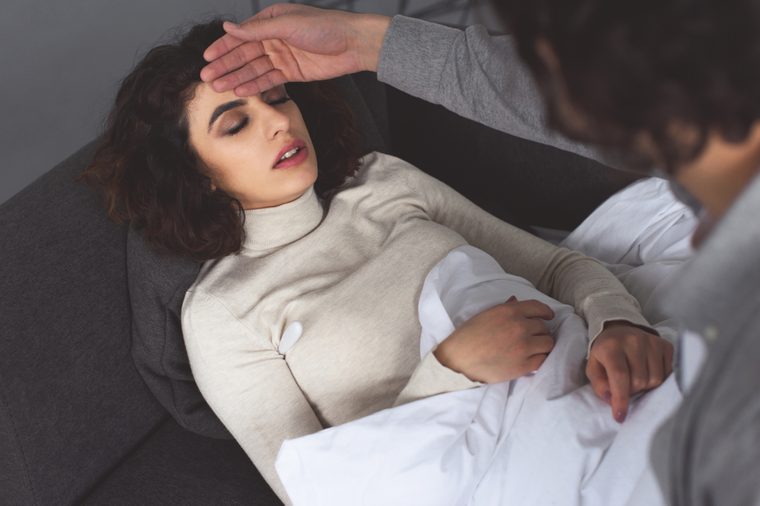
Repeatedly asking the same question about symptoms
“Do I look feverish?” “Does this toe look crooked to you?” It’s natural to ask those around you for help but if you’re constantly peppering your loved ones with questions, asking them to verify the health issues you think you have, you may be a hypochondriac, says Anna Prudovski, a psychologist and clinical director of Turning Point Psychological Services.
The only thing worse than being sick? If no one believes you’re actually sick.

Your doctor is at the top of your frequent calls list
Calling your doctor is a quick way to get reassurance for your health worries but for hypochondriacs, this can turn into a vicious cycle of worry and endless phone calls, Prudovski says. “Remind yourself that nothing in life is certain and that you don’t need to check every single ‘symptom’ even if you have a strong urge to do so,” she advises. Here are 10 questions you should ask your doctor at your next appointment.

Cornering the MD at the PTA meeting to ask about your skin tags
Doctors are used to getting lots of medical questions during their off time and will often tolerate a few but if you can’t resist finding any medical professional in the vicinity and talking their ear off about your symptoms, you may have crossed over into hypochondria, Prudovski. “The most effective treatment for hypochondria is cognitive behavioral therapy (CBT),” she says. “It helps people address their unhelpful beliefs, correct their irrational thoughts, and to change their problematic behaviors.” Ask yourself this: Could stress be making you feel sick?
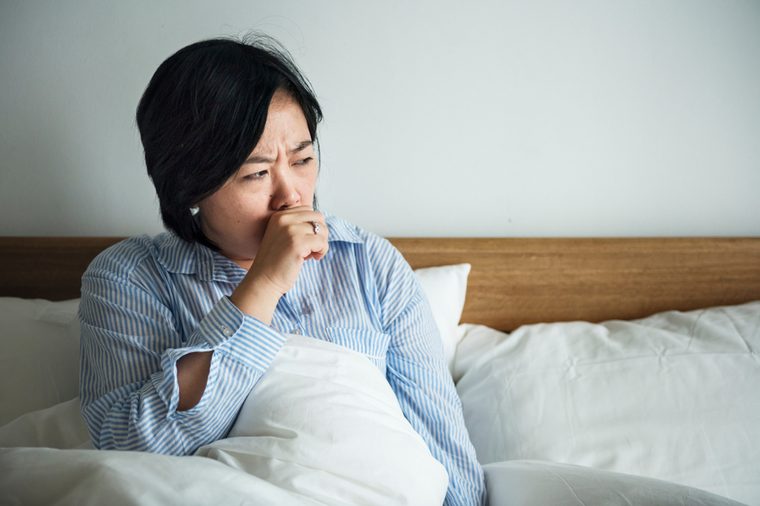
Every throat tickle means you have pneumonia
Hypochondriacs are notorious for catastrophizing—taking a small symptom to it’s worst possible outcome, says Forrest Talley, PhD, Invictus Psychological Services, in Folsom, California. These fears quickly become impervious to reason and logic so to help keep yourself in check, have a friend or family member that you can call to keep you accountable. This doesn’t mean they try to talk you out of your symptoms but rather simply remind you that you have a tendency towards hypochondria and are likely just fine. Learn how to stay healthy with these surprising secrets from people who never get sick.

You feel sick all the time
Do you constantly move from one health worry to the next, never feeling well? Having a rotating cast of vague symptoms that never seem to have any medical cause when you see a doctor may be an indication of hypochondria, says Heidi McBain, a licensed professional counsellor. The next time you catch yourself cataloging every twinge and pain, try to divert your mind by focusing on your senses and staying present in the moment, she says. Here’s what you need to know about lyme disease.

Nothing and no one can make you feel better
Friends tell you that you’re fine. Your spouse says you seem great. Your doctor has given you a clean bill of health. Yet if after all this you still feel sick, there’s a solid chance you’re suffering not from obscure illness but from hypochondria, McBain says. Don’t get caught in this negative loop. “Keep a gratitude journal to help you see and focus on all the positive aspects of your life,” she advises.
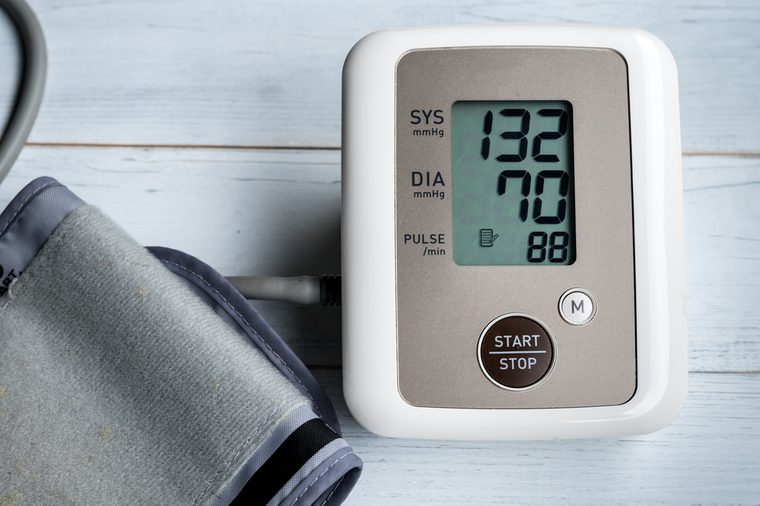
You keep redoing the same tests
People with illness anxiety disorder (IAD), a more accurate term for hypochondria, may have difficulty trusting their clinicians and test results, and may keep asking for additional exams or testing or even to repeat prior tests, says Azra Alic, an anxiety disorder specialist. “The thing is, there will always be one more test that could be run or one more doctor to visit, but at some point, you have to make a choice between living your life fully in spite of uncertainty versus missing out on other parts of your life because you are so busy pursuing certainty,” she says. Psst: This is what the colour of your bruise is trying to tell you.
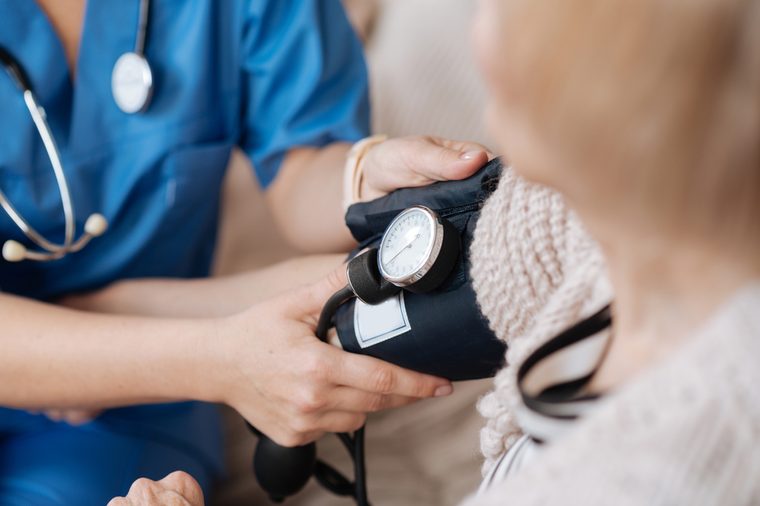
You avoid doctors like the plague (ha!)
This may seem counter-intuitive but some hypochondriacs avoid seeing medical professionals or making appointments for routine checkups as they are so anxious about the possibility of getting bad news, Alic says. Peace will come in accepting that there are no black or white answers about your health and avoiding the doctor can make a potential issue worse, she adds.
Next, find out 10 crucial health tweaks you should make by your 50s.
